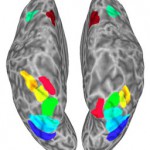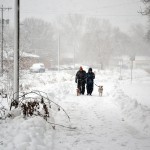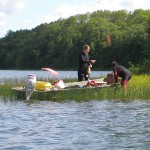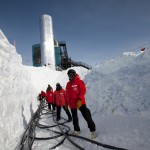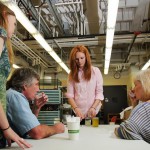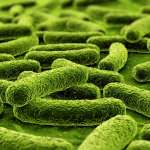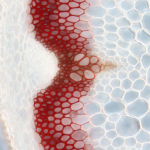Tag Research
Brain pathways tie together mental maps
To find its way in the world, your brain has to decipher a set of directions muddled by different points of view. Read More
Researchers capture speedy chemical reaction in mid-stride
In synthetic chemistry, making the best possible use of the needed ingredients is key to optimizing high-quality production at the lowest possible cost. Read More
Presidential panel taps political scientist’s election expertise
UW–Madison political science professor Barry Burden is helping provide academic research to a bipartisan presidential commission looking into how to improve federal elections. Read More
Weather: More data + more computers = better forecasts
Been beefing about weather forecasts? Did the “experts” miss a thunderstorm, botch the rainfall prediction, mistake cloudy for sunny or windy for calm? You’re not alone. Forecasts of weather are already way better than forecasts of, say, unemployment or grain harvests, but that doesn’t lead us to predict that the caterwauling over weather forecasts will dampen. Read More
In whole-lake experiment, have invasive crayfish met their match?
Four years ago, University of Wisconsin–Madison researchers wrapped up a multi-year effort to dramatically reduce the population of a destructive invasive species in a northern Wisconsin lake. Read More
Improved computing provides a better look at the cosmos
Building a neutrino telescope - a unique instrument that detects extremely small, high energy particles - out of 5,000 optical sensors embedded in a cubic kilometer of Antarctic ice, a tremendous engineering feat, was just the first challenge. Read More
Campus was hopping, at a summertime pace, while you were gone
Rebecca Blank arriving, Kevin Reilly leaving. Budget cuts and tuition freezes. Even if you were vacationing and unplugged over the summer, it was hard to miss these headlines. But you can be excused for not being on top of everything that happened on campus while you were away. Read More
Massive storm pulls water and ammonia ices from Saturn’s depths
Now, thanks to near-infrared spectral measurements taken by NASA’s Cassini orbiter and analysis of near-infrared color signatures by researchers at UW–Madison, Saturn’s superstorm is helping scientists flesh out a picture of the composition of the planet’s atmosphere at depths typically obscured by a thick high-altitude haze. Read More
Language can reveal the invisible, study shows
It is natural to imagine that the sense of sight takes in the world as it is - simply passing on what the eyes collect from light reflected by the objects around us. Read More
Tasty Solution: Better beverages for people who have trouble swallowing
After having a stroke in 2008, Jan Blume lost the ability to swallow for two full years. As she slowly regained that vital function, she faced a new challenge: drinking the thickened beverages that are recommended for people with swallowing problems, or dysphagia. She found the drinks almost intolerable. Read More
Tuberculosis genomes portray secrets of pathogen’s success
By any measure, tuberculosis (TB) is a wildly successful pathogen. It infects as many as two billion people in every corner of the world, with a new infection of a human host estimated to occur every second. Read More
Q&A: Turning fandom into political and social action
As the public's faith in government and traditional political institutions crumbles, younger generations are taking cues from fictional wizards and TV vampires to take action on behalf of issues or causes they believe in. Read More
Discovery of new enzyme could yield better plants for biofuel
For nearly a decade, scientists have thought that they understood how plants produce lignin - a compound that gives plant tissues their structure and sturdiness, but can limit their use as a source of biofuels. Read More
First, fishing. Then, volleyball. Serious fun at Trout Lake Station
Angling for perch at sundown is just one of the perks of Wes Matthews’ summer research job at Trout Lake Station in Wisconsin’s north woods. Another is donning scuba gear and diving for lost equipment. The most important task, though, wouldn’t appeal to everyone. “Basically, I study what fish had for lunch,” says Matthews. Read More
Essential mechanism of symbiosis found in Hawaiian squid
Experiments at the University of Wisconsin–Madison with a small squid that glows in the dark have uncovered a complex conversation that allows the newly hatched squid to attract the glowing, symbiotic bacteria that disguises it against predators. Read More
Children exposed to lead more likely to be suspended from school
Children who are exposed to lead are nearly three times more likely to be suspended from school by the 4th grade than children who are not exposed, according to a new University of Wisconsin–Madison study funded jointly by the Robert Wood Johnson Foundation and the Wisconsin Partnership Program Education and Research Committee. Read More
New gene repair technique promises advances in regenerative medicine
Using human pluripotent stem cells and DNA-cutting protein from meningitis bacteria, researchers from the Morgridge Institute for Research and Northwestern University have created an efficient way to target and repair defective genes. Read More

